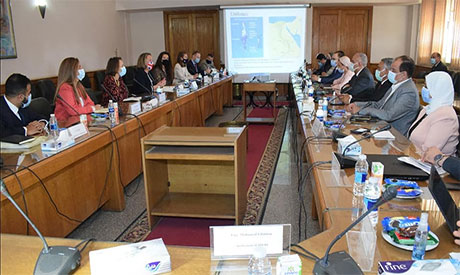
Egyptian Minister of Irrigation and Water Resources Mohamed Abdel-Ati and Minister of Environment Yassmine Fouad during their meeting with British Minister of Trade and Energy Anne-Marie Trevelyan in Cairo on Wednesday, June 16, 2021. (photo courtesy of Irrigation and Water Resources Ministry)
Egypt "is one of the most water-scarce countries in the world,” Minister of Irrigation and Water Resources Mohamed Abdel-Ati told British Minister of Trade and Energy Anne-Marie Trevelyan during a meeting in Cairo on Wednesday.
Egypt needs 114 billion cubic metres (bcm) annually, but it receives an average of 60 bcm only, mainly from the River Nile in light of the very limited amounts of rainwater and groundwater in the desert, Abdel-Ati said.
The country’s population, estimated at over 100 million, is expected to increase by 75 million by 2050, which will add more pressure on Egypt’s water resources, he noted.
Egypt’s annual share of water is 560 m3 per person, cabinet figures show, placing the country well below the international threshold for water scarcity. When annual water supplies drop below 1,000 m3 per person, according to the UN, the population faces water scarcity, and below 500 cubic metres "absolute scarcity."
The Egyptian minister noted that the gap is compensated by the reuse of agricultural wastewater and groundwater in the Valley and Delta, in addition to importing food products that would otherwise consume 34 bcm of water annually to produce.
In a previous statement by Abdel-Ati, he explained that Egypt overcomes water scarcity by importing 54 percent of its virtual water, which is the embedded water required to produce commodities, and reusing 42 percent of its renewable water.
Egypt has drawn a strategy for its water resources until 2050, at a cost of up to EGP 900 billion, he said. It has also developed a four-pronged National Water Resources Plan, running through 2037 and based on rationalising water use, improving water quality, providing additional water resources, and creating a climate suitable for optimal water management, the minister added.
Under this strategy, many projects are being implemented to increase the capacity of the water system to deal with water challenges, including wastewater treatment, seawater desalination, rehabilitation and lining of canals, and switching from surface to modern irrigation systems in agriculture.
Abdel-Ati stressed that "Egypt is one of the countries most affected by climate change," which has negative repercussions on its water resources and threatens sustainable development and people’s right to access water.
This comes, he adds, in light of the rising sea levels and the impact of climate change on the sources of the River Nile.
Many extreme climatic phenomena also come into play, such as heat waves, cold waves and torrential rains, which affect the economic, social, and environmental sectors in the country. Abdel-Ati referred to the effect of climate change on agriculture, food security, energy, health, coastal areas, and Egypt’s northern lakes.
Egypt is also facing the risk of losing 12-15 percent of its lands in the Delta, which are the most fertile, as a result of the expected rise in sea levels and the intrusion of saline water, which affects the quality of groundwater, Abdel-Ati pointed out.
The meeting between Abdel-Ati and Trevelyan was attended by Minister of Environment Yasmine Fouad. It also tackled means to boost joint cooperation in the field of water resources and confronting the repercussions of global warming.
Short link: